The best crypto wallets in 2025 are Best Wallet, Ledger, Trezor, Exodus, Zengo, Trust Wallet, MetaMask, Coinbase Wallet, Tangem, and Phantom. The best cryptocurrency wallet is a secure digital tool used to store, send, and receive cryptocurrencies safely. To choose the best wallet for crypto, you need to consider factors such as security, ease of use, compatibility, functionality, and supported coins.
This guide will cover the best crypto wallets and explain what a crypto wallet is and the different types. We will also explain how to choose a crypto wallet and give a step-by-step guide to set up a Bitcoin wallet.
First, let’s compare the best cryptocurrency wallets and apps based on type, key features, price, and supported coins.
| Wallet | Type | Key Features | Price | Supported Coins/Chains |
| Best Wallet | Non-custodial | Integrated DEX, multi-wallet management, staking, biometric/MFA | Free | 60+ blockchains, 1,000+ tokens |
| Ledger | Hardware | Secure Element chip (EAL5+), multi-signature, NFT/DeFi support | $79 – $399 | 5,500+ coins/tokens |
| Trezor | Hardware | Open-source, PIN/passphrase, Shamir backup, and CoinJoin support | $49 – $179 | 8,000+ coins |
| Exodus | Non-custodial | Real-time charts, staking, NFT marketplace, Trezor integration | Free | 1 M+ assets, 50+ Web3 networks |
| Zengo | Non-custodial | MPC technology, 3FA recovery, in-app purchases, NFT gallery, Web3 Firewall (Pro) | Free (Pro option available) | 380+ coins |
| Trust Wallet | Non-custodial | Binance-backed, staking, NFT/DApp support, biometric authentication | Free | 10 M+ assets, 100+ blockchains |
| MetaMask | Non-custodial | Smart Transactions, batched transactions, DeFi/NFT access, hardware wallet integration | Free | ETH, ERC-20, EVM chains |
| Coinbase Wallet | Non-custodial | DApp browser, biometric/2FA, cloud backups, Ledger integration | Free | Millions of tokens |
| Tangem | Hardware (NFC Card) | EAL6+ chip, multi-card backup, no seed phrase | $54.90 | 6,000+ coins, 70+ blockchains |
| Phantom | Non-custodial | Solana-focused, scam detection, NFT support, Ledger integration | Free | Solana, ETH, Polygon, Bitcoin, Base chains |
1. Best Wallet: Overall best crypto wallet for beginners
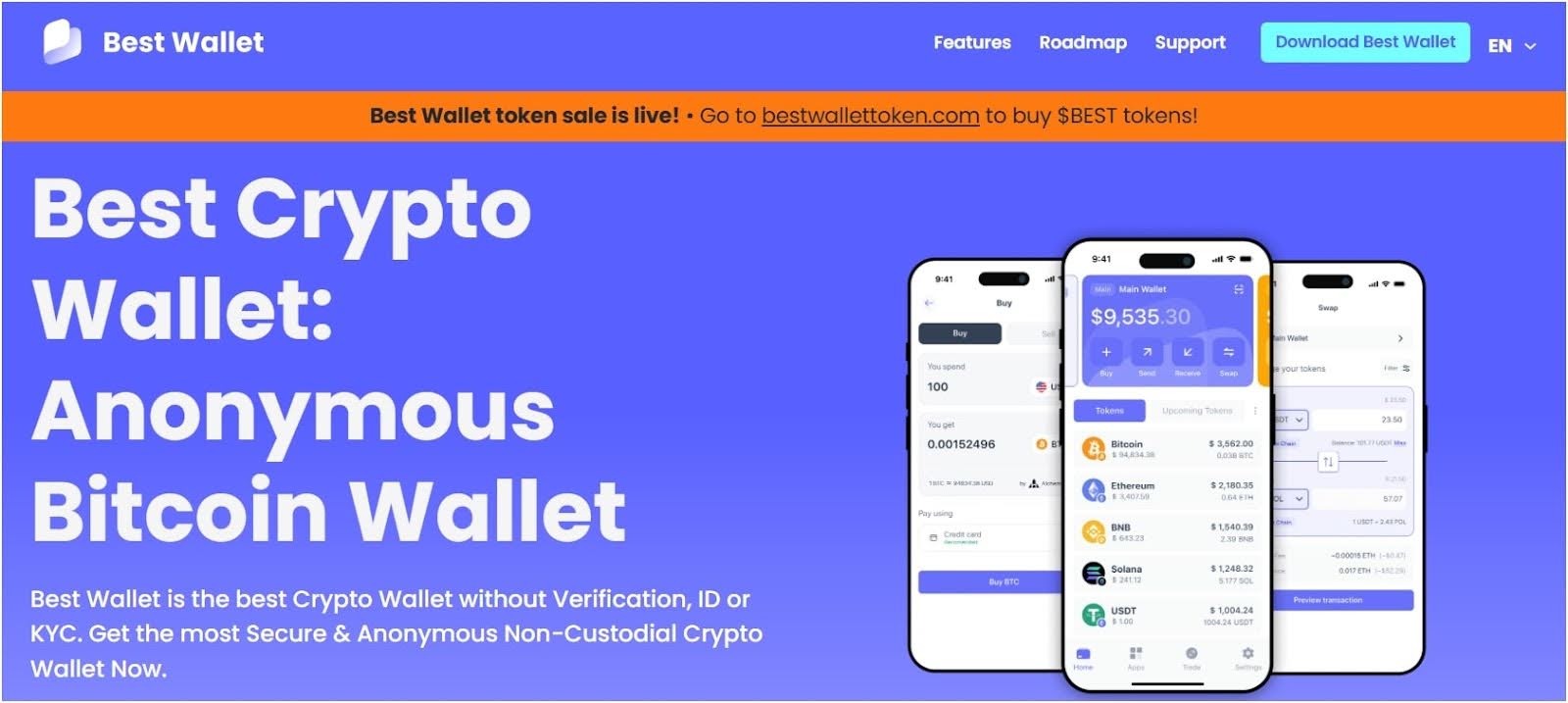
Best Wallet is a non-custodial, mobile crypto wallet that was introduced in 2024. It supports more than 60 blockchains, has an integrated decentralized exchange (DEX) to allow easy token swapping, and offers an interface to decentralized applications (dApps) using its Web3 browser. It also has its native token “BEST”, which is now in presale and has already raised more than $12.8 million.
Best Wallet is also loaded with a number of features that make it highly competitive in the crypto wallet space. First and foremost, its lack of custodial nature is a large one, allowing you full control of your private keys, which are encrypted and kept on your own device.
It also features multi-wallet management, with you being able to manage separate crypto portfolios within the same app. Buying and selling cryptocurrency is also simplified using direct integrations, and you can easily exchange tokens with comparatively low fees. For those who are looking for passive income, there are staking options with high APY (Annual Percentage Yield) from their DeFi partners.
Supported Coins and Chains: Best Wallet supports quite a broad array of cryptocurrencies and blockchain networks. You can look forward to finding mainstream coins such as Bitcoin (BTC), Ethereum (ETH), Solana (SOL), Dogecoin (DOGE), Litecoin (LTC), USDT, and numerous others. Also, Best Wallet is made to be a multi-chain wallet, meaning it can accommodate over 60 various blockchains and over 1,000 cryptocurrency tokens.
Security Features: Best Wallet also has very good security features, such as biometric and multi-factor authentication (MFA), that protect your funds. Also, it leverages Fireblocks’ institutional-grade security technology, using Multi-Party Computation (MPC) for increased security without sacrificing user experience. You can also set up 2FA for an extra layer of security.
Pros of Best Wallet
Supports over 60 blockchains, including Bitcoin, Ethereum, and BNB Chain Built-in DEX lets you swap tokens quickly without leaving the app Offers strong security with fingerprint login and a two-step verification system Uses Fireblocks’ MPC technology for extra safety and reduced hacking risk $BEST token gives you zero gas fees and early project accessCons of Best Wallet
No desktop version available, only works on mobile devices right now Limited customer support options if you face issues or lose access2. Ledger: Best crypto hardware wallet
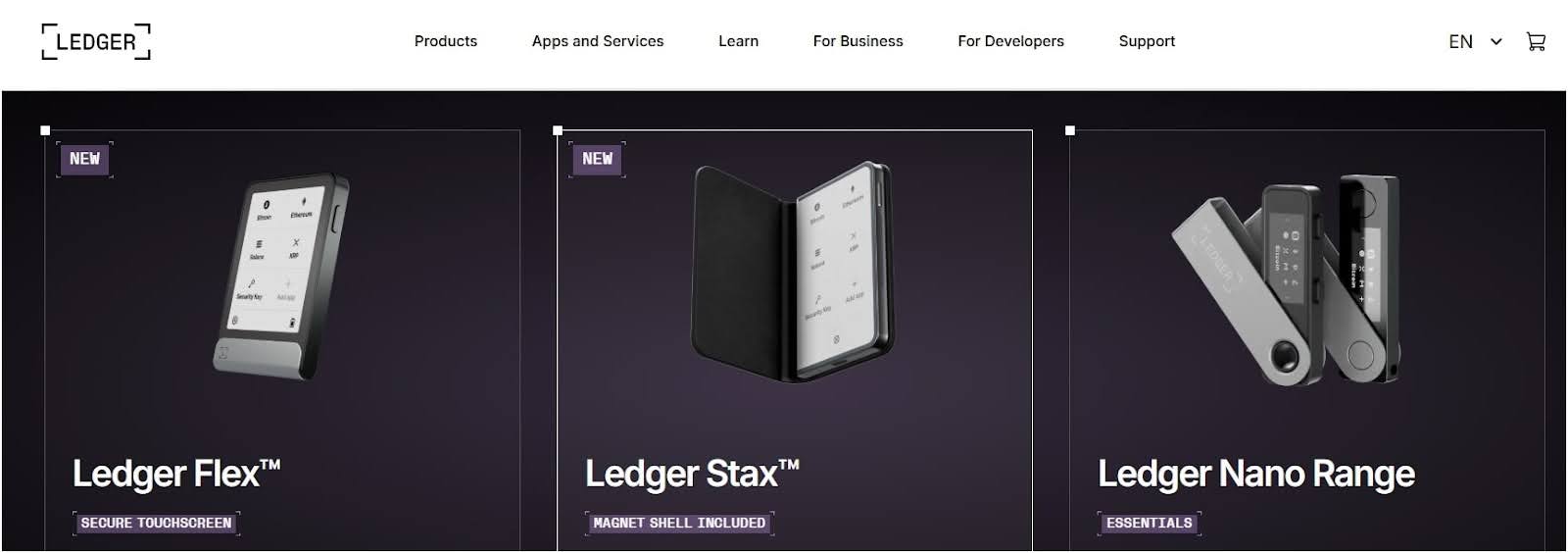
Ledger is a hardware wallet, so it’s a physical device that keeps your crypto stored offline, out of reach of online attackers like hackers and malware. It has been on the market for some time now, and more than 6 million units have been sold, which indicates how much confidence people have in their products.
Ledger devices employ many features, including a Secure Element chip. This Secure Element chip has an EAL5+ security certification, which provides top-level security. The wallets feature a 24-word recovery phrase. You can also include an optional 25th word, which is a passphrase feature, for added security. Ledger devices also feature two-factor authentication as well as multi-signature security.
Ledger Live is the companion app for these wallets. Here, you can easily buy, sell, exchange, and stake cryptocurrencies. The app also handles NFTs and DeFi apps, and has support for both desktop and mobile platforms. They have various models such as the Nano S Plus, Nano X, and the more recent Stax and Flex, each with varying features to meet different purposes, ranging from simple security to high-end versions with touchscreens and Bluetooth.
Supported Coins and Chains: Ledger products support many cryptocurrencies, 5,500 various coins and tokens. This consists of all the major names you’d anticipate, such as Bitcoin (BTC), Ethereum (ETH), Ripple (XRP), Cardano (ADA), Solana (SOL), and Dogecoin (DOGE), among several others. Not only does it handle these major coins, but also a number of tokens, such as ERC-20 tokens on the Ethereum blockchain, TRC-20 tokens, and BEP-20 tokens.
Pricing: Ledger has a couple of different models, so you’ll have options based on your needs and budget. The Ledger Nano S Plus is kind of their entry model, and it normally costs about $79. Going up, the Ledger Nano X typically costs around $149, and it has features such as Bluetooth. For those looking for a bit of an upgrade, there’s the Ledger Flex for around $249, and the Ledger Stax, their flagship device, at around $399. The Stax, for instance, has a bigger E Ink touchscreen and wireless charging.
Pros of Ledger
Ledger uses cold storage to protect your crypto from online hacks It supports over 5,500 coins and blockchain networks for flexibility Ledger devices include EAL5+ certified secure chips for extra safety Ledger Live app lets you buy, sell, stake, and manage assets The wallet allows adding a 25th word for more security controlCons of Ledger
Ledger suffered a data breach in 2020, exposing customer information Ledger Live doesn’t support every coin natively, needing third-party appsStore your crypto with Ledger’s ultra-secure hardware wallet – enjoy military-grade encryption, Bluetooth freedom, multi-coin support, and easy backup for total peace of mind.
3. Trezor: Best open-source crypto cold wallet
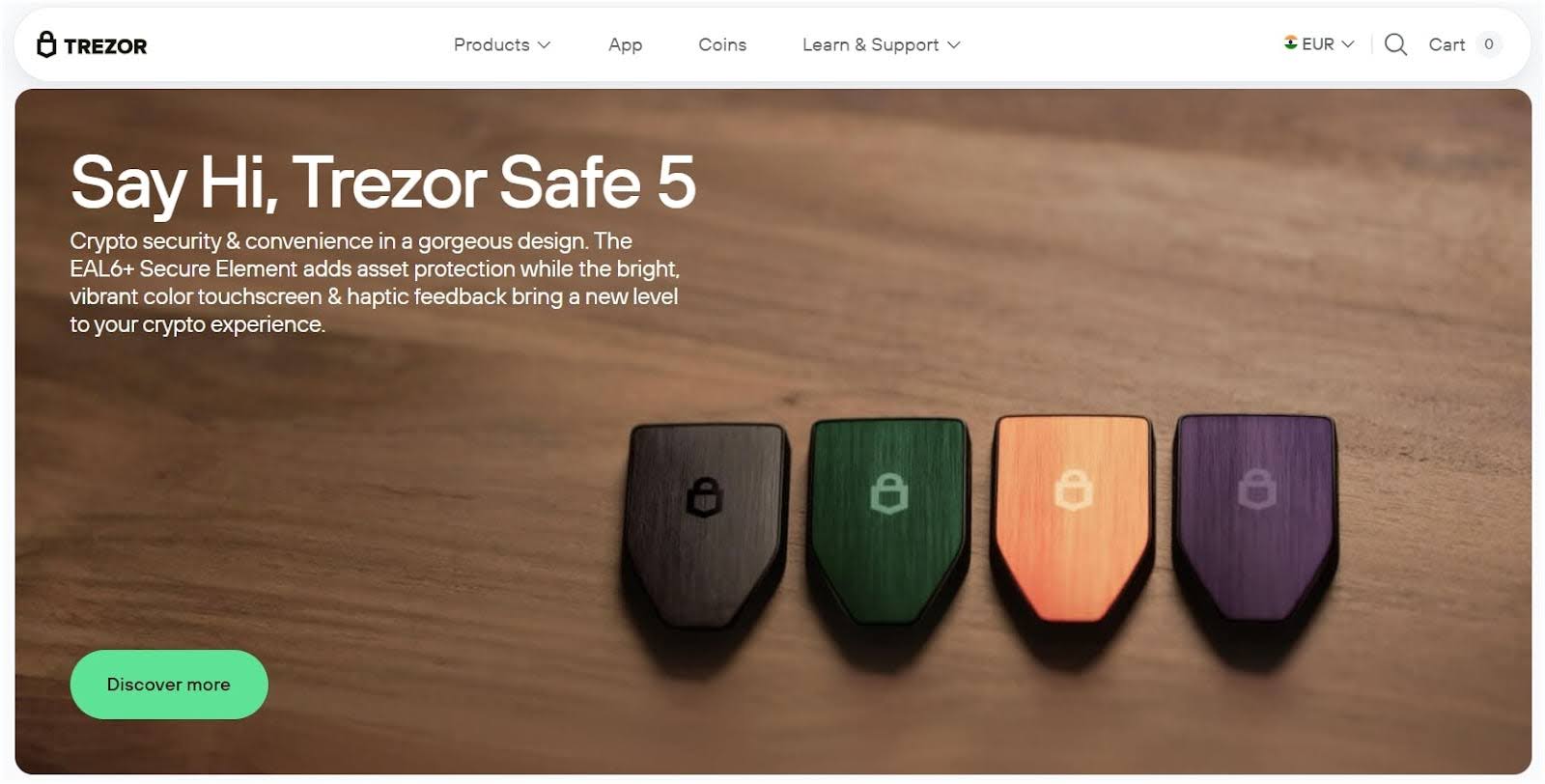
Trezor is another secure crypto hardware wallet. It was actually among the first to introduce hardware wallets to the market, beginning way back in 2014 with the Trezor One. This long history has built a lot of trust in the crypto community, and they’re known for their commitment to open-source security, meaning their code is now publicly available for anyone to review.
Trezor wallets have some of the most important security features to ensure your crypto is safe, such as PIN protection, passphrase feature, and Shamir backup. On top of that, it offers firmware updates every few weeks. Managing your assets is also very simple through their Trezor Suite application, which lets you send, receive, and even trade or stake your coins right from your computer or phone.
Supported Coins and Chains: Trezor supports 8,000+ cryptocurrencies and blockchain networks, including the majority of popular digital assets available. You can safely store and manage major coins such as Bitcoin (BTC), Ethereum (ETH), Litecoin (LTC), Zcash (ZEC), and Dogecoin (DOGE). In addition to these, Trezor also accommodates an immense number of other coins and tokens, such as ERC-20 tokens, as well as newer chains such as Solana (SOL), Cardano (ADA), and Polygon PoS.
Pricing: Trezor offers a series of hardware wallets in various capacities and prices. The Trezor Model One, being their first and cheapest, usually costs around $49. If you want more advanced features, the Trezor Model T can be purchased for around $179. This one has a color touchscreen, which makes it slightly easier to navigate than the first model, and it also includes Shamir Backup for better recovery capabilities. Later on, Trezor released the Trezor Safe 3, which costs around $79, and the Trezor Safe 5, selling at around $169. Both of these new devices use a Secure Element chip for added device security.
Pros of Trezor
Keeps your private keys securely offline, safe from online threats Open-source code provides transparency and allows for community audits PIN protection and passphrase features add strong layers of security 8,000+ cryptocurrencies and tokens supported User-friendly Trezor Suite applicationCons of Trezor
No built-in Bluetooth connectivity on their most popular Trezor Model T version Limited staking options compared to some other walletsProtect your crypto with Trezor’s open-source hardware wallet – enjoy Tor support for privacy, CoinJoin transaction mixing, Shamir backup, and multi-coin access for total security.
4. Exodus: Best hot wallet for crypto desktop users
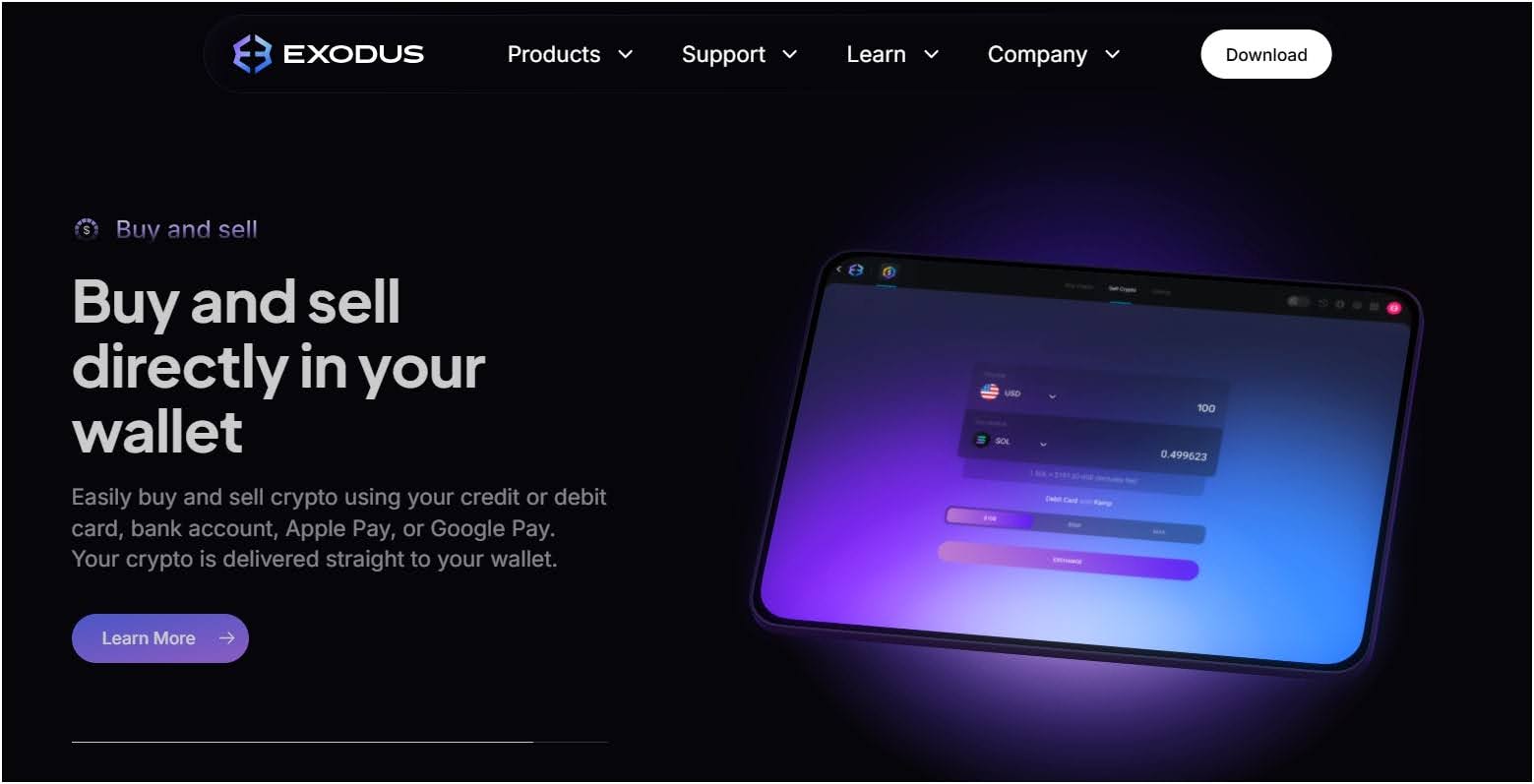
Exodus is a well-known desktop crypto wallet, having been out since 2015, and it’s designed to be extremely easy to use. It provides you with a transparent view of your portfolio with real-time price charts, allowing you to easily monitor your assets. The wallet further supports integration with Trezor hardware wallets for offline security.
And it’s a non-custodial wallet, which is a huge thing because it means you, and only you, have complete control of your private keys. Exodus never stores your money or personal data, which really adds to the privacy and security. They’ve also added features like staking, so you can make some passive earnings on some of the cryptocurrencies, and even an NFT marketplace.
Supported Coins and Chains: Exodus currently supports more than 1 million various crypto assets, all ERC-20 tokens included. This means that you can hold widely used coins such as Bitcoin (BTC), Ethereum (ETH), Solana (SOL), and other low-cap altcoins in one place. Plus, it supports assets on more than 50 Web3 networks.
Security and Compatibility: As for security, Exodus prioritizes having your private keys remain on your device. They also employ strong encryption on your entire data set, and you lock your wallet with a robust password. However, Exodus does not provide classical two-factor authentication (2FA) options in the form of SMS or authenticator apps. Still, one key security benefit is its hardware wallet compatibility with devices such as Trezor (Model One and Model T). Exodus is widely compatible, available on Windows, macOS, and Linux for desktop, and on iOS and Android for mobile devices.
Pros of Exodus
Exodus has a clean interface that is simple for beginners to use You can store, send, and receive millions of cryptocurrencies easily It supports desktop, mobile, and browser, offering strong cross-platform access You can stake certain coins directly and earn passive crypto rewards The wallet includes a built-in exchange for fast token swaps anytime It integrates with Trezor hardware wallets for added offline security supportCons of Exodus
Exodus does not support two-factor authentication for extra login security Transaction fees can be higher than average during swaps within the wallet5. Zengo: Most secure crypto wallet with MPC technology
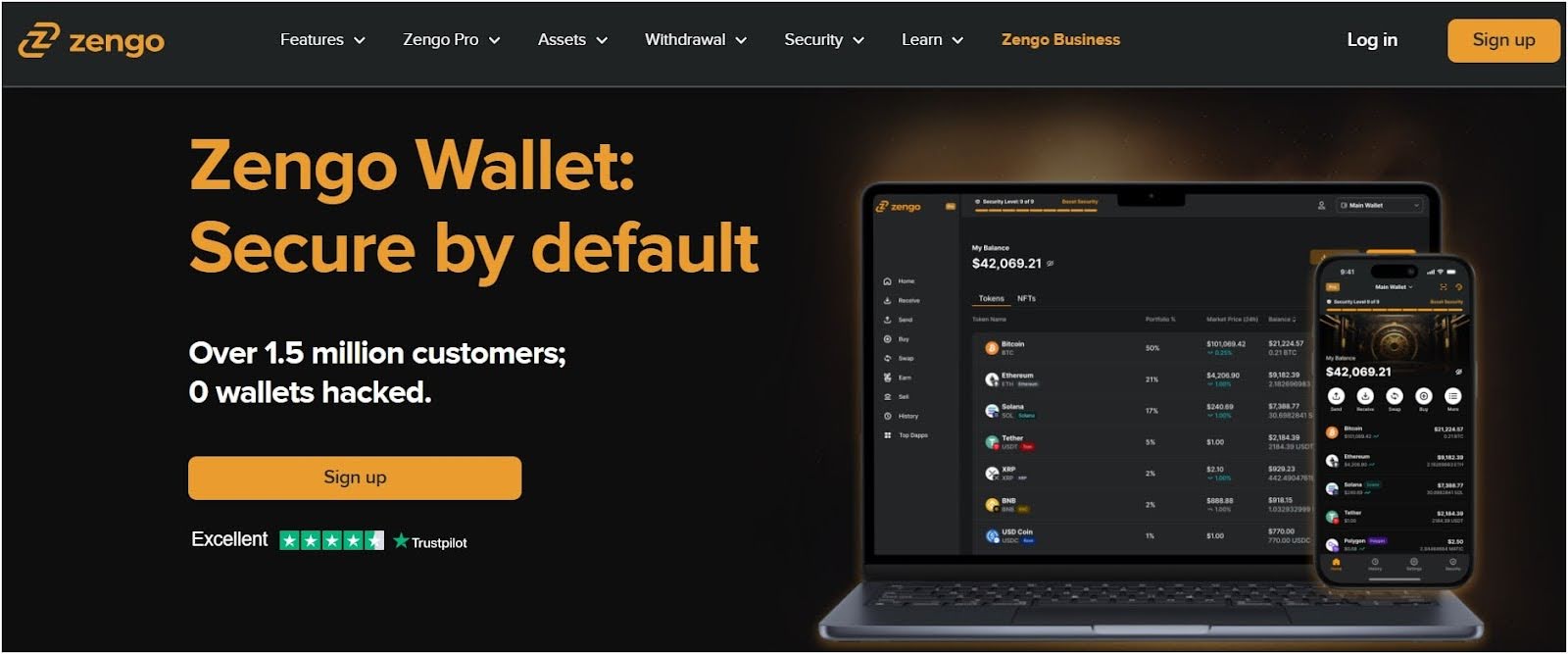
Zengo is a self-custodial crypto wallet that uses Multi-Party Computation (MPC) technology instead of traditional private keys or seed phrases. You can purchase, sell, and trade crypto assets directly on the app through multiple payment methods, including credit cards, Apple Pay, and Google Pay. Zengo also provides features such as an in-app NFT gallery and an NFT spam filter.
Supported Coins and Chains: Zengo supports more than 380 cryptocurrencies and Web3 assets. You will have access to well-known coins like Bitcoin (BTC) and Ethereum (ETH) to choose from, naturally. Aside from that, they also support widely used stablecoins, such as Tether (USDT) and USD Coin (USDC). On the network side, Zengo supports several major blockchains, including Bitcoin, Ethereum, BNB Chain, Dogecoin, Tron, Tezos, and XRP. They also include prominent Layer 2 solutions, like Polygon, Arbitrum One, Optimism, and Base.
Security Features: The security model of Zengo is based on MPC technology. In addition to the MPC technology we discussed, they also feature a three-factor authentication (3FA) recovery system. This utilizes your email, a 3D FaceLock (which is an encrypted scan of your face that supposedly cannot be spoofed with a picture or mask), and a recovery file that you can leave in your cloud storage service, such as iCloud or Google Drive. For additional protection, Zengo has a “Pro” option that includes features such as enhanced withdrawal protection, linking withdrawals to your 3D FaceLock biometrics, and a Web3 Firewall that warns you of suspicious behavior from decentralized applications.
Pros of Zengo
Zengo removes seed phrases, so you don’t need to store anything The wallet uses 3-factor authentication for better account protection and recovery You can store and manage over 380 cryptocurrencies in one app It offers in-app crypto purchases using cards, Apple Pay, or Google Pay. Zengo Pro adds extra security tools like Web3 firewall and Legacy TransferCons of Zengo
Zengo is a mobile-only wallet with no browser version You must upload a face scan, which some people may find uncomfortable6. Trust Wallet: Best mobile crypto wallet
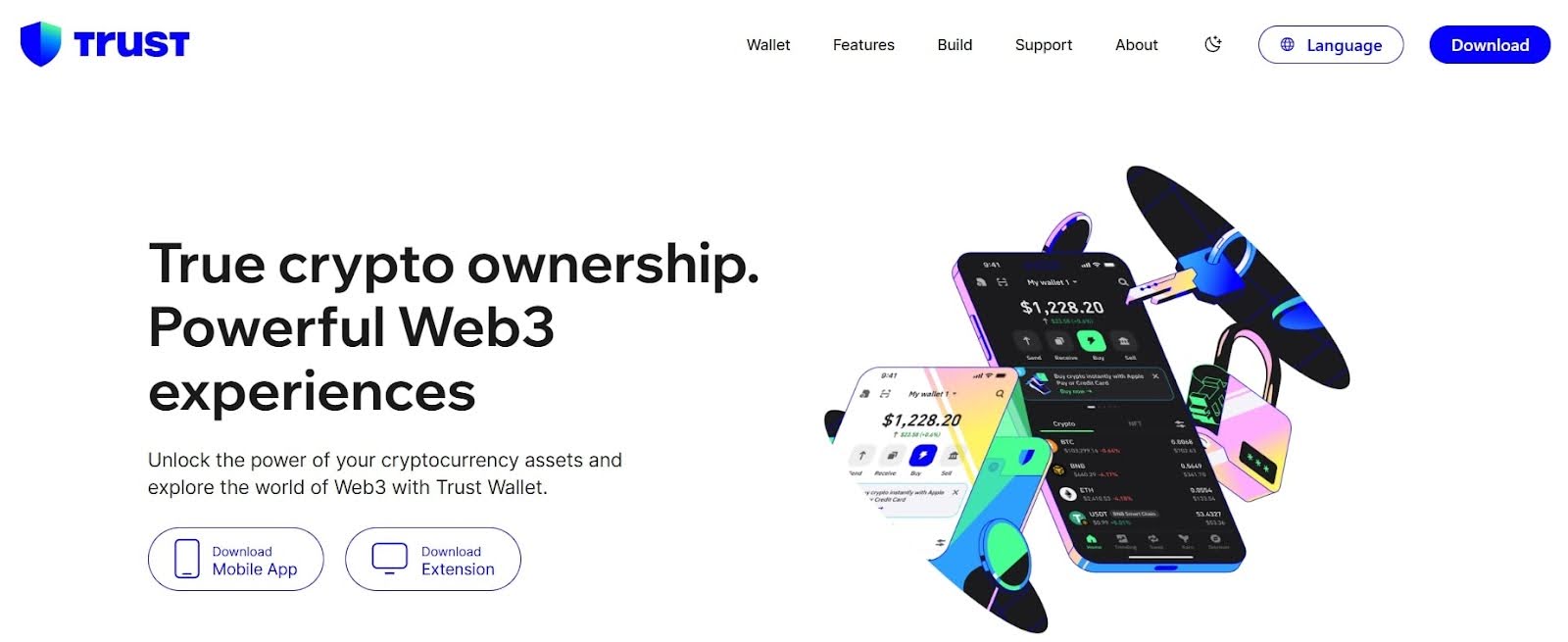
Trust Wallet is another best crypto wallets that was founded in 2017 and later acquired by Binance, one of the biggest crypto exchanges out there. This really solidified its position in the market. It’s a non-custodial wallet. Trust Wallet also enables staking for several coins, offering passive income opportunities. Plus, it supports NFTs and provides access to decentralized applications (DApps) through its integrated browser.
Supported Coins and Chains: Trust Wallet supports a massive range of digital assets, handling over 10 million different cryptocurrencies and tokens across more than 100 blockchains. You can also manage your NFTs on different chains, all in one spot, which is super handy for collectors. Beyond just storing, it lets you interact with different decentralized finance (DeFi) platforms and even offers native staking options for a good number of cryptocurrencies, like Ethereum, Polkadot, and Cardano.
Security and Compatibility: Trust Wallet is a self-custodial wallet; your private keys are encrypted and stored directly on your device, not on a central server. It also includes a Security Scanner feature that helps users avoid potential scams by analyzing transaction addresses for risks before you send funds. This proactive approach helps protect its large user base. The wallet regularly undergoes security audits by independent firms like CertiK to ensure its robustness. It’s also ISO certified for both security and privacy, which is a big plus. You can further enhance your security by enabling biometric authentication, like fingerprint or face ID. Trust Wallet is compatible with Android and iOS devices, as well as a browser extension for desktop use.
Pros of Trust Wallet
Supports a huge variety of cryptocurrencies and digital assets The mobile app is really user-friendly, great for beginners You can directly swap and stake crypto within the app It includes a built-in browser for decentralized applications (dApps) It’s free to download and use; only network fees applyCons of Trust Wallet
Limited desktop functionality, mainly through a browser extension Does not natively connect to hardware wallets7. MetaMask: Best Ethereum and ERC-20 wallet
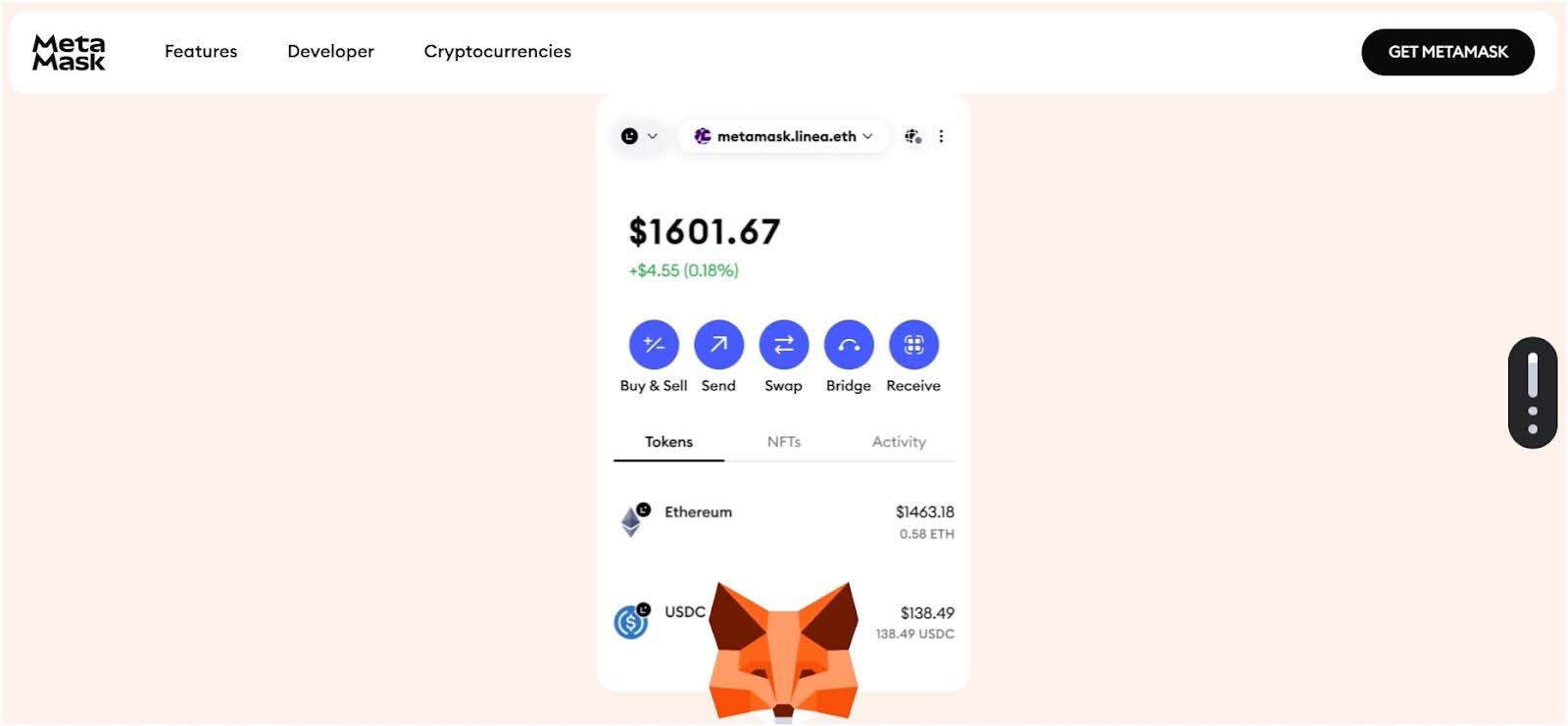
MetaMask is a popular crypto wallet that allows you to hold, send, and receive digital currencies. It’s a free and open-source software wallet that has existed since 2016, and it is developed by ConsenSys, a popular Ethereum development studio. MetaMask exists as a browser extension and as a mobile app. What sets it apart is its ease of use; it makes it easy to connect to different decentralized finance (DeFi) protocols, NFT platforms, and Web3 games.
MetaMask offers features like Smart Transactions, which improve transaction success rates and protect against front-running bots. It also introduced batched transactions, allowing users to combine steps like “approve and swap” into a single action.
Supported Coins and Chains: MetaMask was first created for the Ethereum blockchain, which means it natively supports Ether (ETH) and all ERC-20 tokens, which are the norm for most Ethereum tokens. But that is not all. MetaMask is super flexible, compatible with a broad number of Ethereum Virtual Machine (EVM)-compatible chains. These include prominent blockchains such as BNB Chain, Polygon, Avalanche, Arbitrum, Optimism, and Linea, among several others. In the future, MetaMask will further increase its native support, with ambitions to add Solana and Bitcoin.
Security and Compatibility: Private keys are stored locally on your device by MetaMask. Your private keys, along with the wallet data, are encrypted, giving an extra layer of security. MetaMask also includes phishing protection, which alerts you to potentially dangerous sites or bad links. For even greater security, MetaMask is completely compatible with hardware wallets such as Ledger and Trezor.
Pros of MetaMask
MetaMask supports many popular blockchains like Ethereum, Polygon, and BNB Chain. You can access thousands of dApps directly from your wallet interface The wallet offers integration with hardware wallets like Ledger and Trezor MetaMask allows token swaps within the app using multiple liquidity sources New features like Smart Transactions improve reliability and reduce failed transfersCons of MetaMask
Gas fees can be high during network congestion, especially on Ethereum Limited support for non-EVM chains, though this is improving in 20258. Coinbase Wallet: Best hot wallet for DeFi
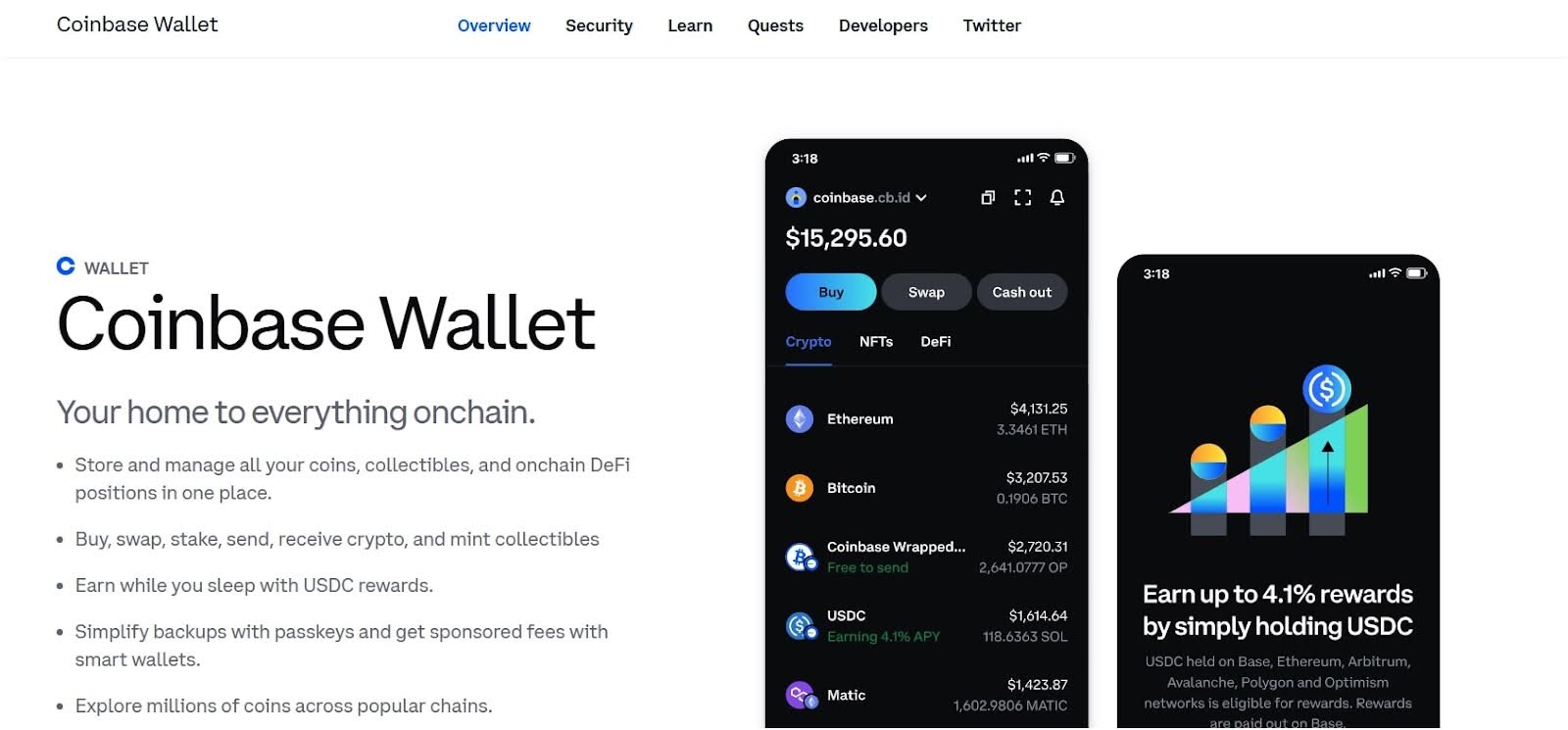
Coinbase Wallet is a hot wallet developed by Coinbase. Now, unlike the regular Coinbase exchange account, where your crypto is held by Coinbase, the Coinbase Wallet is a “self-custody” wallet. This means you, and only you, have control over your private keys.
The wallet is designed to be user-friendly, making it suitable for both beginners and experienced users. It also has a built-in decentralized application, or dApp browser, which is a neat feature allowing you to interact directly with various decentralized finance (DeFi) protocols and NFT marketplaces without ever leaving the wallet itself.
Supported Coins and Chains: Coinbase Wallet supports millions of tokens, such as BTC, ETH, SOL, LTC, and more. Beyond these well-known coins, it also has extensive support for all ERC-20 tokens. What’s more, it’s compatible with all Ethereum Virtual Machine (EVM) compatible networks, like Polygon, Avalanche C-Chain, Base, BNB Chain, Optimism, and Arbitrum, with many of these already pre-configured for ease of use.
Security and Compatibility: The wallet employs biometric authentication methods like fingerprint and face recognition, along with two-factor authentication (2FA), to enhance security. It also offers encrypted cloud backups of your recovery phrase. Also, the Coinbase Wallet browser extension can be connected to Ledger hardware wallets. The wallet is compatible with both iOS and Android mobile devices, as well as desktop browsers through its extension.
Pros of Coinbase Wallet
Supports 100+ countries and thousands of tokens across many chains Full control of private keys stored securely on your local device Works with Ledger hardware wallet for added offline asset protection Let you explore DApps, NFTs, and DeFi services directly in-app Offers encrypted cloud backups and biometric authentication for better securityCons of Coinbase Wallet
No support for XRP, BCH, XLM, and ETC Limited customer support compared to centralized exchanges like the Coinbase app9. Tangem: Best NFC-based cold wallet for crypto
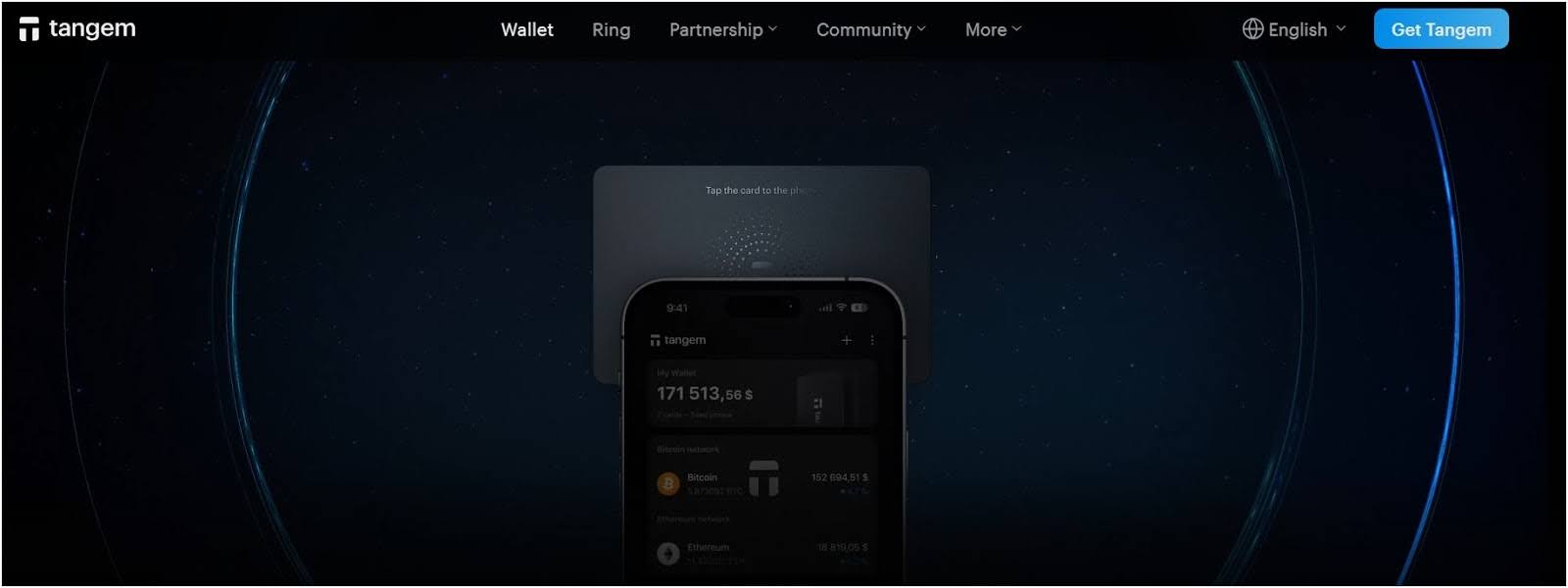
Tangem is another top crypto hardware wallet with NFC capabilities. But this is the fun part: instead of most hardware wallets that resemble a USB stick or a small display, Tangem is like a credit card. It’s relatively thin, weighing only around 6 grams, and fits neatly into your normal wallet.
This card is based on Near Field Communication (NFC) technology, so you simply tap it on your smartphone to control your assets via their app. One of the major benefits is that there are no cables and batteries required, so it is extremely handy for use on the go. Plus, it aims to eliminate the traditional seed phrase vulnerability by offering a multi-card backup system instead.
It is designed to be long-lasting, water and dust-resistant, and can withstand extreme temperatures, with a minimum 25-year lifespan. No personal data is collected by Tangem, nor does it need KYC. Its security center is a secure element chip certified to EAL6+, a very high level of security, comparable to what you have in banking cards and biometric passports.
Supported Coins and Chains: The Tangem Wallet supports more than 6,000 different cryptocurrencies and more than 70 blockchain networks. The wallet also supports different tokens of well-known Web3 projects. You can access decentralized applications (dApps) using the WalletConnect protocol.
Pricing or Cost: The standard 2-card set has a price tag of $54.90, offering a simple configuration for safe storage of crypto assets. For additional backup and recovery, there is the 3-card set priced at $69.90.
Pros of Tangem
Tangem uses an EAL6+ certified chip for top-level hardware security Supports over 6,000 cryptocurrencies across more than 70 blockchain networks Private keys never leave the card, ensuring strong key protection Durable design resists water, dust, extreme temperatures, and electromagnetic attacks No KYC or personal data required, ensuring full user privacyCons of Tangem
Does not support desktop platforms, limited to mobile (iOS and Android) Limited availability in some regions may cause longer shipping times10. Phantom: Best Solana and Bitcoin wallet

Phantom is the most popular Solana crypto wallet. Now, it also supports Ethereum, Polygon, and Bitcoin, allowing you to manage various assets in one place. You can view and swap tokens, interact with decentralized apps, and manage NFTs across these networks.
Supported Coins and Chains: Phantom started as the top wallet for the Solana blockchain, which is pretty impressive given Solana’s growing popularity for NFTs and DeFi. However, Phantom has grown a lot and now supports more than just Solana. You can easily manage your assets on Ethereum and also on Polygon, a popular scaling solution for Ethereum. More recently, Phantom has even added support for Base and Bitcoin.
Security and Compatibility: Phantom places a strong emphasis on security. It is a non-custodial wallet. The wallet includes features like transaction previews and scam detection to enhance security. Integration with hardware wallets like Ledger adds an extra layer of protection.
Pros of Phantom
Supports Solana, Ethereum, Polygon, and Bitcoin in one single wallet Offers in-wallet token swaps with low fees and fast confirmation times Allows NFT storage, viewing, and transfers directly inside the wallet interface Integrated scam detection alerts you before signing risky or fake transactions Works with Ledger hardware wallets for better security and offline key storageCons of Phantom
No support for BNB Chain or Avalanche at this time Advanced features like staking are mainly limited to the Solana blockchain onlyWhat Is a Crypto Wallet?
A crypto wallet is a digital wallet that lets you store, send, and receive cryptocurrencies, such as Bitcoin or Ethereum. Basically, it is a secure place where you keep the private keys to your digital assets. The wallet simply holds the keys that give you access to your funds on that public ledger. So, when you send crypto, you’re essentially signing a transaction with your private key, allowing the network to update the ownership records.
What Are the Best Crypto Wallets in 2025?
The best crypto wallets in 2025 are Best Wallet, Ledger, Trezor, Exodus, Zengo, Trust Wallet, MetaMask, Coinbase Wallet, Tangem, and Phantom.
What Are Different Types of Crypto Wallets?
The different types of crypto wallets are hot wallets, cold wallets, paper wallets, custodial wallets, and non-custodial wallets.
Hot Wallets: Hot wallets are internet-connected crypto wallets. This makes them super easy to use for fast sending and receiving of crypto, similar to having a mobile banking application. Cold Wallets (Hardware Wallets): Cold wallets, also referred to as hardware wallets, are just the opposite of hot wallets – they’re not internet-connected. These are hardware devices, usually in the form of a USB stick, that you use to store your private keys offline. Paper Wallets: A paper wallet is literally a piece of paper with your public and private keys written on it. You can create such keys offline and then print them out. Although they’re great for security because they are totally offline, you need to be extremely cautious not to misplace the paper or damage it, since your funds cannot be recovered if that occurs. Custodial Wallets: With a custodial wallet, someone else (such as a cryptocurrency exchange like Binance or OKX) stores and controls your private keys for you. It’s much like a conventional bank storing your money. It’s extremely convenient since you don’t need to think about handling your own keys or security, which is fantastic for newcomers. Non-Custodial Wallets: Non-custodial wallets leave you in full control of your keys. That means you are entirely responsible for protecting your keys. You’ll usually receive a “seed phrase” (a series of words) that is a master key used to restore your wallet if you lose access.What Is a Cold Crypto Wallet?
A cold crypto wallet is basically a gadget that holds your private keys for your cryptocurrency entirely offline, away from the internet. Since it is not linked to any online networks, it provides a much greater degree of security against hacking, malware, and other threats in cyberspace.
Such crypto wallets are usually physical devices, such as a USB drive, that are tailored specifically for this purpose. They are seen as the most secure means of holding large sums of cryptocurrency over the long term.
How Does a Cold Wallet Work?
The working of a cold wallet is based on keeping your private keys isolated from any internet environment. When you buy a cold wallet, it creates a key pair: a public key (your wallet address, such as an account number) and a private key (your secret signature, such as a password).
The private key is what actually gives you control over your crypto. With a cold wallet, this private key is generated and stored solely on the device itself and never seen by the internet. To send crypto, you make the transaction request on a computer, but the actual “signing” of said transaction with your private key occurs internally inside the cold wallet device.
The device does this cryptographic signature offline. After signing, the signed transaction (and not your private key) is then transferred to the internet-enabled computer, which relays it onto the blockchain. Through this, your important private key is kept safe and isolated.
How to Set Up a Cold Wallet?
Here is a step-by-step guide on setting up a cold wallet:
Buy Directly from the Manufacturer: First and foremost, always purchase your hardware wallet directly from the official website of the manufacturer. This is really important since it prevents any tampering or compromise that can occur when you purchase from a third-party reseller. Initialize the Device and Set a PIN: After you get your wallet, you’ll plug it into your computer and go through the on-screen instructions to set it up. While doing this, you’ll come up with a distinctive PIN code. Your PIN is the first of your defenses; you’ll be using it each time you access your wallet, so keep it strong and memorable. Generate and Safeguard Your Recovery Phrase: This is likely the most important step. Your wallet will display a “seed phrase” or “recovery phrase,” usually a list of 12 or 24 random words. That phrase is the master key to your money. You simply have to physically write this down on the recovery card that is provided and keep it in a secure, hidden place, away from your computer and wallet itself. Never keep it digitally or take a photograph. Send Crypto to Your Wallet: Once you have established and backed up your recovery phrase, you can now send cryptocurrency to your new cold wallet. Find your public address on your wallet’s interface (which can be shared safely). Next, visit your best cryptocurrency exchange or other wallet and trigger a withdrawal to this public address. It’s usually best to send a small test transaction first to make sure everything functions properly before sending a larger transaction.What Is a Hot Crypto Wallet?
A hot crypto wallet is a type of cryptocurrency wallet that is always connected to the internet. These wallets are usually software-based and can be accessed through web browsers (web wallets), applications on your desktop computer (desktop wallets), or apps on your mobile phone (mobile wallets). They are designed for convenience and ease of access, allowing users to send and receive cryptocurrencies quickly and easily.
Are Hot Wallets Safe for Crypto?
Yes, hot wallets are safe for certain uses, but they also carry significant risks. They are convenient for storing small amounts of crypto for everyday transactions, similar to keeping pocket cash. Many reputable exchanges and wallet providers invest heavily in security measures like encryption, two-factor authentication (2FA), and regular security audits to protect user funds. For casual users who only hold minimal amounts, the convenience often outweighs the perceived risk, especially if strong passwords and 2FA are used.
However, because hot wallets are constantly online, they are inherently more vulnerable to cyber threats. This includes hacking attempts on the service provider, malware on your device, phishing scams, or even simple user error that exposes your private keys. If a hacker gains access to your internet-connected device or the service provider’s servers, your funds could be at risk. This makes them unsuitable for storing large sums of cryptocurrency over the long term.
What Are the Main Differences Between Hot Wallet vs. Cold Wallet?
The main difference between hot and cold wallets revolves around their connectivity, security, and intended use. The largest difference is connectivity: hot wallets are always connected to the internet, but cold wallets are totally offline. This directly translates to their security levels. Cold wallets are much safer from online attacks such as hacking, malware, and phishing because their private keys are never accessible over the internet. Hot wallets, while easy to use, are constantly exposed to these threats.
In terms of convenience, hot wallets win hands down. They allow for quick, easy transactions from anywhere with an internet connection, making them ideal for frequent crypto trading or spending. Cold wallets, on the other hand, are less convenient as they require physical access and a few more steps to initiate transactions, but this inconvenience is a trade-off for superior security.
How to Choose a Crypto Wallet?
To choose a crypto wallet, you need to consider factors such as security, ease of use, compatibility, functionality, and supported coins and blockchains.
Security
You would like a wallet with strong security features that safeguard your digital assets from theft and hackers. Ensure it has such features, like two-factor authentication (2FA), which introduces an additional level of security that does not just rely on a password. Also, check if the wallet supports multi-signature, where more than one signature is required before transactions can be made. For large holdings, a cold wallet (such as a hardware wallet) is more secure because it stores your private keys offline. Always opt for a wallet with a solid history and transparent security policies.
Ease of Use
Though security is most important, a wallet must also be easy to use if you’re new to cryptocurrencies. An easy-to-use interface can make all the difference in your experience. Look for wallets with clear navigation, simple processes for sending and receiving crypto, and easily understandable features. If a wallet is too overwhelming or cumbersome, you may inadvertently make mistakes, so find one that feels natural and comfortable for you.
Compatibility
Compatibility describes how well the wallet interacts with your devices and operating systems. Do you mostly use a desktop computer, a mobile phone, or both? Some wallets are available for only certain platforms, such as iOS or Android, while others are cross-platform compatible. You should also think about whether the wallet is compatible with the kinds of decentralized applications (dApps) or other blockchain services you would want to use.
Functionality
Different crypto wallets offer different functionalities beyond just storing coins. Some wallets might have built-in exchange features, allowing you to swap cryptocurrencies directly within the app without needing to go to an external exchange. Others might offer staking options, letting you earn rewards by holding certain coins. If you’re interested in interacting with DeFi (Decentralized Finance) protocols or NFTs, you’ll need a wallet with a dApp browser or specific integrations.
Supported Chains and Coins
Not all crypto wallets support all cryptocurrencies or blockchain networks. If you intend to store different digital tokens, you must make sure the wallet you select supports all of them. Some wallets are “multi-currency” and can support many coins and tokens from multiple blockchains, but some may be only for Bitcoin or Ethereum.
What Crypto Wallet Has the Lowest Fees?
Crypto wallets like Best Wallet, Trust Wallet, and MetaMask have the lowest fees because these are free to download and generally do not charge direct fees for holding crypto. When you make a transaction, you will only pay the network fee (also known as “gas fee”), which goes to the blockchain network to process your transaction, not to the wallet provider.
What Is the Safest Crypto Wallet Now?
The safest crypto wallets available now are generally considered to be hardware wallets like Ledger and Trezor. They are safest because they store your private keys completely offline, isolating them from internet-connected devices.
What Are Non-Custodial Crypto Wallets?
Non-custodial crypto wallets are wallets where you, the user, have complete control and ownership over your private keys. This means you are solely responsible for securing your keys and ultimately your funds. The best non-custodial crypto wallets are Best Wallet, Zengo, MetaMask, and Trust Wallet.
How to Set Up a Crypto Wallet?
Step 1: Choose the Appropriate Type of Wallet
First, determine what type of crypto wallet you need. If you’re just starting with small amounts and prefer ease for repeated transactions, a “hot” software wallet (such as MetaMask or Trust Wallet) could work. They’re programs you install on your mobile phone, computer, or browser. But if you are going to store a lot of crypto for the long term and want maximum security, a “cold” hardware wallet (such as Ledger or Trezor) is generally your best option.
Step 2: Download/Buy or Install the Wallet
For a software wallet, you need to go to the provider’s official website (e.g., metamask.io) or download the app from a secure app store (Google Play Store or Apple App Store). It’s extremely important to only download from official websites to prevent malicious apps.
If you’re purchasing a hardware wallet, you have to buy it directly from the official website of the manufacturer. Never buy a used hardware wallet or from an unauthorized reseller because it may be compromised. Once downloaded or received, execute the installation steps for your own wallet, which typically means running an installer or plugging the device in via USB.
Step 3: Create Your Wallet and Secure Your Private Keys
This is probably the most important step. For most non-custodial wallets (your own keys), you’ll usually be asked to set up a new wallet. The wallet will then create a “seed phrase”, often a list of 12 or 24 words. Write down these words precisely. You will also typically need to save a robust password or PIN for everyday use of the wallet on your system.
Step 4: Fund Your Wallet
Every wallet has a “Receive” or “Deposit” tab, showing your public wallet address. This is the address you provide to others to receive cryptocurrency, much like providing a bank account number.
So, proceed to where your crypto is being stored currently (e.g., a cryptocurrency exchange such as Binance or Coinbase, or another wallet) and execute a withdrawal to the public address of your new wallet. Once verified on the blockchain, your funds will be transferred to your new wallet. If you don’t have a crypto exchange, you can register on Binance to get a free $100 crypto sign-up bonus. Also, for information, read our in-depth Binance review.
How We Evaluate Crypto Wallets?
We evaluate crypto wallets based on factors such as security, ease of use, compatibility, functionality, and supported coins and chains. These criteria help us determine how well a wallet protects your assets, how simple it is to navigate, if it works with your devices, what features it offers beyond basic storage, and if it supports the specific cryptocurrencies you own or plan to acquire.
The post Top 10 Best Crypto Wallets: Safest and Most Secure Picks for 2025 appeared first on CryptoNinjas.




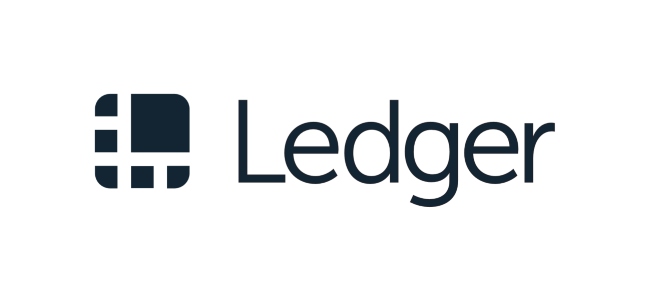
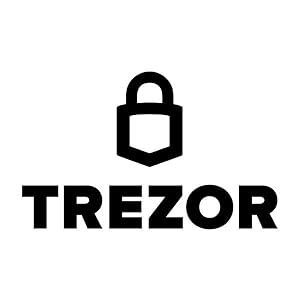

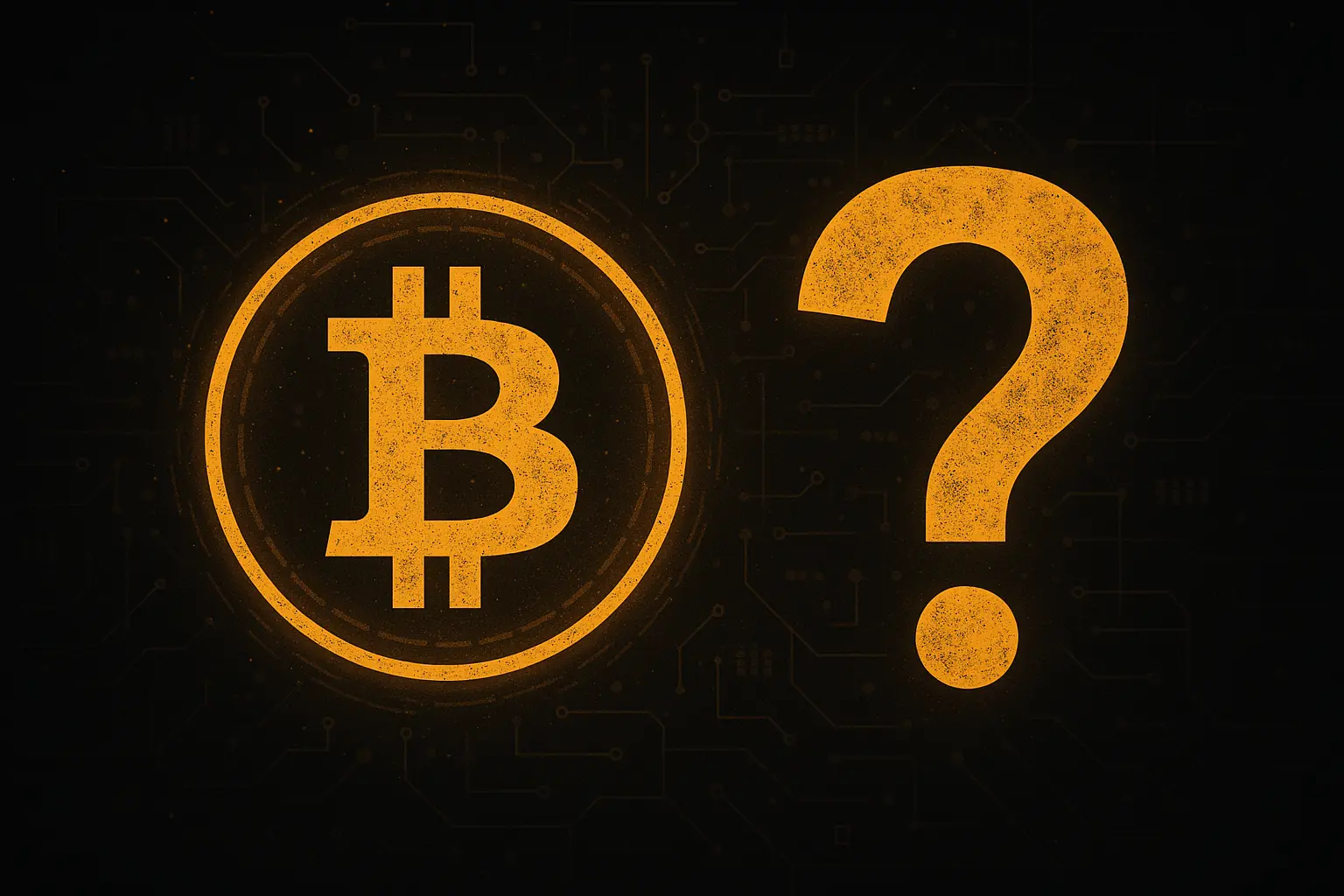








 Bengali (Bangladesh) ·
Bengali (Bangladesh) ·  English (United States) ·
English (United States) ·